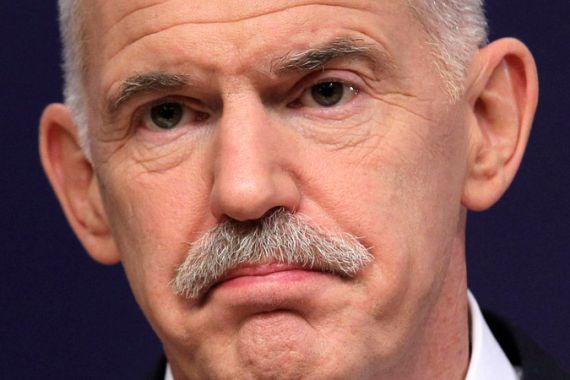Greek PM expected to step down
George Papandreou says he will resign as soon as a deal for an interim coalition government is reached.

George Papandreou, Greece’s prime minister, will not head a new coalition government, which could be agreed upon with the opposition as early as Sunday, a statement from his office said.
“It is clear that this government will pass the baton but it will not pass it to a void – it will pass it to a new
government, if we agree on it, and I hope this will happen soon,” he said on Sunday during an emergency cabinet meeting.
“And when I say soon, I mean today, not tomorrow. I’m not interested in being prime minister in the new government.”
Papandreou also told his cabinet that elections should not be held before February or March, after a eurozone bailout is approved by parliament; and asked President Carolos Papoulias to convene a meeting right away with him and conservative opposition leader Antonis Samaras to move coalition talks forward.
Political leaders are struggling to agree on creating an interim government.
Papandreou has said he will resign once power-sharing talks conclude on a replacement. However, Samaras has insisted that Papandreou’s resignation come first.
Papandreou has come under fire at home and abroad for his shortlived plan for a referendum on a eurozone bailout deal.
He survived a confidence vote in parliament on Saturday, but politicians from his party have called on him to quit.
Calls to resign
Earlier on Sunday, President Papoulias opened talks with Samaras, the leader of the conservative New Democratic Party, as part of an effort to defuse the political crisis gripping the country.
| In Depth | |||||||||||
|
The developments came as Papandreou continued to struggle to forge a unity government.
For his part, Samaras said Greece had to offer a “message of stability” to the rest of the world.
“We need to send a message of stability and confidence to the outside world and stability and normality domestically,” he said as he entered into the talks with the president.
Samaras had called on Saturday for “immediate” elections, a scenario that Papandreou has dismissed as a “catastrophe”.
“We have not asked for any place in his government,” Samaras said in a televised address.
“All we want is for Mr Papandreou to resign, because he has become dangerous for the country. We insist on immediate elections.”
Papandreou insists only a coalition government, ruling for at least several months, can set Greece on the road to recovery and secure a financial lifeline from international lenders.
Opinion polls
Opinion polls suggested Greeks favour Papandreou’s model of a longer-serving unity government. Surveys by two Italian newspapers showed the public backed the idea of a national unity government.
But Papandreou’s leadership seemed to be in doldrums in the wake of reports that Evangelos Venizelos, his deputy and finance minister, was also keen to lead the next coalition government.
“Venizelos is having contacts with party leaders to secure their agreement,” a government official who requested anonymity said.
Papandreou won a confidence vote in the Socialist-led parliament on a pledge that he was willing to step aside and form a cross-party caretaker government.
“My aim is to immediately create a government of co-operation,” Papandreou said.
“A lack of consensus would worry our European partners about our country’s membership of the eurozone.”
